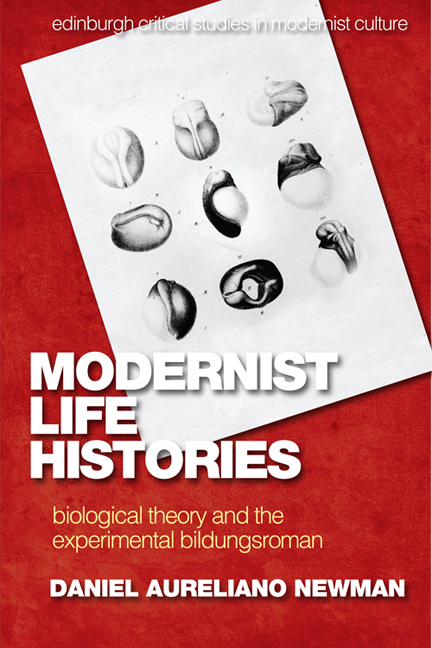Book contents
- Frontmatter
- Contents
- List of Figures
- Preface
- Acknowledgements
- Series Editors’ Preface
- List of Abbreviations
- Introduction
- 1 Bildung, Biology and the Narrative Structure of Development
- 2 A Portrait of the Artist as a ‘Biologist in Words’: Language, Epiphany and Atavistic Bildung
- 3 Mendelian Inheritance, ‘Eternal Differences’ and Entropy in Howards End
- 4 ‘Tampering with the Expected Sequence’: Heterochrony and Sex Change in Orlando
- 5 Anachrony, Neoteny and the ‘Education of an Amphibian’ in Eyeless in Gaza
- 6 Beginning Again: Darwin’s Caterpillar from George Eliot to Beckett
- Conclusion
- Bibliography
- Index
5 - Anachrony, Neoteny and the ‘Education of an Amphibian’ in Eyeless in Gaza
Published online by Cambridge University Press: 23 April 2021
- Frontmatter
- Contents
- List of Figures
- Preface
- Acknowledgements
- Series Editors’ Preface
- List of Abbreviations
- Introduction
- 1 Bildung, Biology and the Narrative Structure of Development
- 2 A Portrait of the Artist as a ‘Biologist in Words’: Language, Epiphany and Atavistic Bildung
- 3 Mendelian Inheritance, ‘Eternal Differences’ and Entropy in Howards End
- 4 ‘Tampering with the Expected Sequence’: Heterochrony and Sex Change in Orlando
- 5 Anachrony, Neoteny and the ‘Education of an Amphibian’ in Eyeless in Gaza
- 6 Beginning Again: Darwin’s Caterpillar from George Eliot to Beckett
- Conclusion
- Bibliography
- Index
Summary
My novelist must be an amateur zoologist. Or, better still, a professional zoologist who is writing a novel in his spare time. His approach will be strictly biological.
– Aldous Huxley, Point Counter Point (1928: 320)In his innocuously titled essay ‘The Theory of Recapitulation: A Critical Restatement of the Biogenetic Law’ (1922), Walter Garstang delivers a devastating attack on the biogenetic law. Reserving particular scorn for Haeckel's dictum that ‘Phylogenesis is the mechanical clause of Ontogenesis’, Garstang presents ontogeny as a creative process rather than a mere effect of history, giving the individual a leading role in the evolutionary process. ‘Ontogeny’, he continues, ‘is not an animated cinema show of ancestral portraits; but zygotes may be likened to conjurers playing the old tricks for the most part, and occasionally opening a surprise packet’ (Garstang 1922: 81, 100). Few passages better support my claim that the narratives emerging in early twentieth-century biology look distinctly modernist. There are, indeed, intriguing similarities between Garstang's rejection of linear recapitulation and Woolf's dismissal of plot as a ‘series of gig lamps symmetrically arranged’ (EVW iv.160), or Forster's hopes for novels which bring ‘not rounding off but opening out’ (AN 116). Yet Garstang's metaphor has undeveloped potentialities of its own. He sees film merely as a succession of images, each displacing its predecessor and running through the same steps in the same order; he seems not to recognise that film might exemplify the new, non-linear dynamics he found in evolutionary embryology.
Many of Garstang's contemporaries were more receptive to film as a medium able to explore hitherto unthinkable narrative possibilities. Among them was Aldous Huxley, who notes in ‘Where Are the Movies Moving?’ (1926) that the techniques of film editing allow ‘the maker of films’ to break new ground where the writer deals with words, which are ‘traditional and hereditary things, impregnated by centuries of use with definite meanings and association’ (1926a: 184). These inherited limitations certainly include plot structures, including the Bildung plot he mocks in Crome Yellow (1921) and avoids in ten of his eleven novels. Film is by contrast unencumbered by convention, and the ease with which it breaks sequences and associations represents one of ‘the most pregnant potentialities of the cinema’; unlike the written word, writes Huxley, film ‘may be developed into something entirely novel’ (1926a: 184).
- Type
- Chapter
- Information
- Modernist Life HistoriesBiological Theory and The Experimental Bildungsroman, pp. 134 - 162Publisher: Edinburgh University PressPrint publication year: 2018



